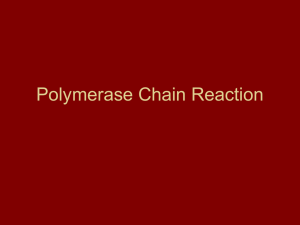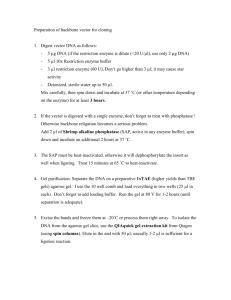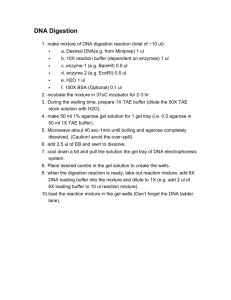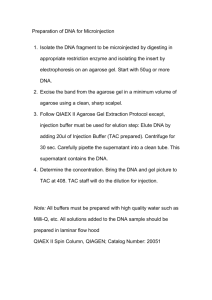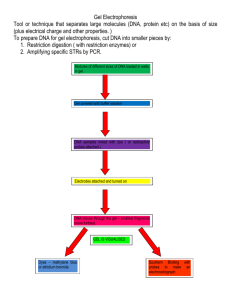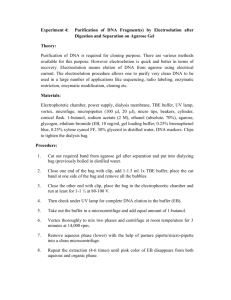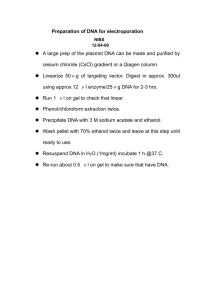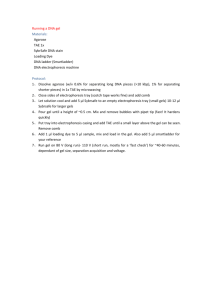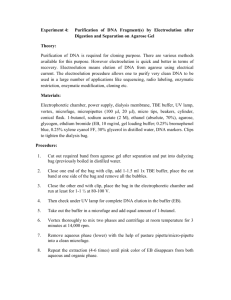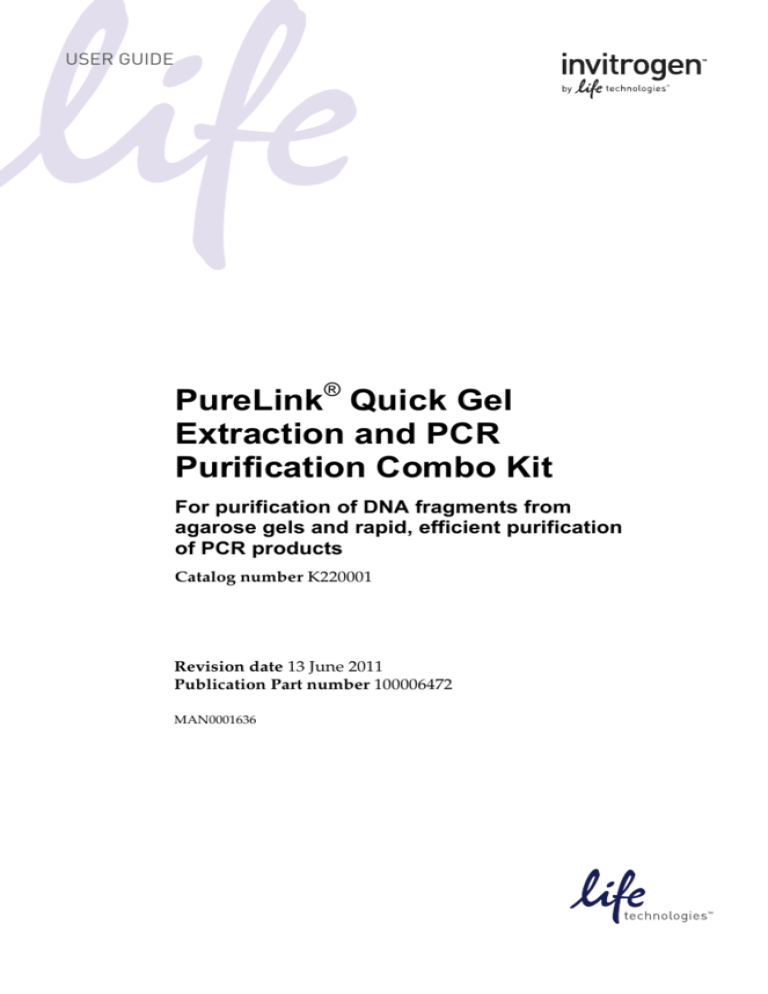
USER GUIDE
PureLink® Quick Gel
Extraction and PCR
Purification Combo Kit
For purification of DNA fragments from
agarose gels and rapid, efficient purification
of PCR products
Catalog number K220001
Revision date 13 June 2011
Publication Part number 100006472
MAN0001636
ii
Contents
Kit Contents and Storage ........................................................................................ iv
Description of the System .......................................................... 1
About the Kit.............................................................................................................. 1
Experimental Overview ........................................................................................... 4
Methods ........................................................................................ 6
Before Starting ........................................................................................................... 6
Gel Extraction Protocol............................................................... 8
General Guidelines.................................................................................................... 8
Preparing the Gel Slice ............................................................................................. 9
Purifying DNA from Gels Using a Centrifuge................................................... 11
Purifying DNA from Gels Using a Vacuum Manifold ..................................... 13
Gel Extraction Troubleshooting............................................................................ 15
PCR Purification Protocol......................................................... 16
Purifying DNA ........................................................................................................ 16
PCR Purification Troubleshooting ....................................................................... 18
Appendix .................................................................................... 19
Estimating DNA Yield and Quality ..................................................................... 19
Accessory Products ................................................................................................. 22
Technical Support ................................................................................................... 23
Purchaser Notification............................................................................................ 25
iii
Kit Contents and Storage
Shipping and
storage
All components of the PureLink® Quick Gel Extraction and
PCR Purification Combo Kit are shipped at room
temperature. Upon receipt, store all components at room
temperature.
Contents
The components included in the PureLink® Quick Gel
Extraction and PCR Purification Combo Kit are listed in the
following table.
Sufficient reagents are included to perform 50 reactions.
Component
Cat. no.
K220001
Gel Solubilization Buffer (L3)
Intended use
iv
2 × 90 mL
Binding Buffer (B2)
15 mL
Wash Buffer (W1)
16 mL
Elution Buffer (E1)
(10 mM Tris-HCl, pH 8.5)
15 mL
PureLink® Clean-up Spin Columns
(in Wash Tubes)
50 each
PureLink® Elution Tubes
50 each
For research use only. Not intended for any animal or
human therapeutic or diagnostic use.
Description of the System
About the Kit
Introduction
Use the PureLink® Quick Gel Extraction and PCR
Purification Combo Kit with silica membrane-based
PureLink® Clean-up Spin Columns to rapidly and efficiently
purify DNA fragments from agarose gels, and from PCR or
restriction enzyme reactions.
A gel extraction protocol is included for purifying DNA
from TAE or TBE agarose gels of various percentages, and
with different melting points in ~30 minutes. For your
convenience, purification protocols are provided for
centrifugation and with a vacuum manifold.
A PCR purification protocol is provided to efficiently
remove primers, dNTPs, enzymes, and salts from PCR
products in less than 15 minutes. The purified PCR product
is suitable for automated fluorescent DNA sequencing,
restriction enzyme digestion, and cloning.
Note: The PureLink® Quick Gel Extraction and PCR
Purification Combo Kit is not designed to purify supercoiled
plasmid DNA or genomic DNA from agarose gels. Only
linear DNA fragments may be purified from gels using
these kits.
System
overview, gel
extraction
To purify DNA fragments from agarose gels using the
PureLink® Quick Gel Extraction and PCR Purification
Combo Kit, dissolve the excised gel using the Gel
Solubilization Buffer. The Gel Solubilization Buffer enables
efficient extraction of the DNA fragment from TAE or TBE
agarose gels without any additional solutions or
modifications to the protocol. After sufficiently dissolving
the gel, you can purify and elute the DNA fragment using a
centrifuge or vacuum manifold, as described in the
following paragraph.
You will place the dissolved gel slice into a PureLink®
Clean-up Spin Column containing a silica membrane. The
DNA will bind to the membrane using a centrifuge or
vacuum manifold. You will then wash the membrane with
Wash Buffer containing ethanol to remove impurities and
elute the purified DNA into an Elution Tube using Elution
Buffer (10 mM Tris-HCl, pH 8.5). The purified DNA is
suitable for use in a variety of downstream applications.
Continued on next page
1
About the Kit, Continued
System
overview,
PCR
purification
To purify DNA fragments from PCR reactions, or restriction
digests using the PureLink® Quick Gel Extraction and PCR
Purification Combo Kit, mix the PCR product with Binding
Buffer to adjust conditions so that they are optimal for
subsequent dsDNA binding to the PureLink® Clean-up Spin
Column.
Purifying DNA is based on the selective binding of dsDNA
to silica-based membrane in the presence of chaotropic salts.
The dsDNA binds to the silica-based membrane in the
column. Remove impurities by thoroughly washing the
column with Wash Buffer. Elute the dsDNA in low salt
Elution Buffer or water.
Downstream
applications
The purified DNA is suitable for various downstream
applications, including:
DNA sequencing
Cloning
Restriction enzyme digestion
PCR reactions
Labeling
Continued on next page
2
About the Kit, Continued
Kit
specifications
Starting Material:
≤400 mg agarose gel slice,
or 50–100 μL PCR product
(50 ng–40 μg dsDNA)
Binding Capacity:
40 μg dsDNA per column
Column Reservoir Capacity:
800 μL
Wash Tube Capacity:
2.0 mL
Elution Tube Capacity
1.7 mL
Centrifuge Compatibility:
>10,000 × g
Elution Volume:
50 μL
DNA Recovery:
>80% for gel extraction, or
Up to 95% for PCR
purification (dependant
on DNA fragment size)
DNA Fragment Size:
40 bp–10 kb
Separation Range:
0.1–12 kb from 10–40 mer
primers
Primer Removal:
>99%
3
Experimental Overview
Gel extraction
purification
workflow
The flow chart below provides an overview for purifying
DNA fragments from agarose gels using the PureLink®
Quick Gel Extraction and PCR Purification Combo Kit.
Excise gel slice
Weigh gel slice
Add Gel Solubilization
Buffer (L3) to gel slice
and incubate at 50ºC
Apply dissolved gel to
PureLink® Clean-up
Spin Column in a
Collection Tube
Apply dissolved gel to
PureLink® Clean-up
Spin Column fitted in
a luer tap
Wash column with
Wash Buffer (W1)
Wash column with
Wash Buffer (W1)
Add Elution Buffer (E1)
into center of
PureLink® Spin Column
Add Elution Buffer (E1)
into center of
PureLink® Spin Column
Elute DNA into
PureLink® Elution Tube
Elute DNA into
PureLink® Elution Tube
Continued on next page
4
Experimental Overview, Continued
PCR
purification
workflow
The flow chart below provides an overview for purifying
DNA from PCR reactions using the PureLink® Quick Gel
Extraction and PCR Purification Combo Kit.
®
®
®
5
Methods
MEND
ION
AT
RECOM
Before Starting
Preparing
Binding Buffer
(B2) with
isopropanol
The Gel Solubilization Buffer (L3) contains guanidine
isothiocyanate (an irritant). This chemical is harmful
when in contact with the skin, or when it is inhaled or
ingested. For your protection, always wear a laboratory
coat, gloves, and safety glasses when handling buffers.
Do not add bleach or acidic solutions directly to
solutions or sample preparation waste that contains
guanidine isothiocyanate, as reactive compounds and
toxic gases are formed.
Dispose of buffers and chemicals in appropriate waste
containers.
Follow the recommendations below to obtain the best results:
Maintain a sterile working environment when handling
DNA to avoid any contamination from DNases.
Ensure that no DNase is introduced into the sterile
solutions supplied with the kit.
Make sure all equipment that comes in contact with
DNA is sterile, including pipette tips and tubes.
Before beginning, prepare the Binding Buffer (B2) with
isopropanol as follows:
1.
Add 10 mL isopropanol to the Binding Buffer (B2).
2.
Mark the box on the Binding Buffer (B2) label to
indicate that isopropanol was added.
3.
Store the Binding Buffer (B2) with isopropanol at room
temperature.
Continued on next page
6
Before Starting, Continued
Preparing
Wash Buffer
(W1) with
ethanol
Before beginning, prepare the Wash Buffer (W1) with
ethanol as follows:
1.
Add 64 mL 96–100% ethanol to the Wash Buffer (W1).
2.
Check the box on the Wash Buffer (W1) label to indicate
that ethanol was added.
3.
Store the Wash Buffer (W1) with ethanol at room
temperature.
7
Gel Extraction Protocol
General Guidelines
Introduction
Instructions for preparing the gel slice containing the DNA
fragment of interest are included in this section.
The PureLink® Quick Gel Extraction and PCR Purification
Combo Kit is not designed to purify supercoiled plasmid
DNA or genomic DNA from agarose gels. Only linear DNA
fragments should be purified from gels using these kits.
Materials
needed
Agarose gel containing the DNA fragment
Weighing paper or weigh trays
Scale (sensitive to 0.001 g)
Water bath or heat block set at 50°C
1.7-mL or 5-mL polypropylene microcentrifuge tubes
Clean, sharp razor blade
Gel Solubilization Buffer (L3) (supplied with kit)
(Optional) 100% isopropanol
Agarose gels
DNA fragments can be purified from various percentages of
TAE and TBE agarose gels and from agarose gels with
different melting points, without modifying the protocol.
Follow specific directions regarding gels containing
>2% agarose.
DNA
fragments
The PureLink® Quick Gel Extraction and PCR
Purification Combo Kit is suitable for purifying DNA
fragments from 40 bp–10 kb in size. Larger DNA
fragments may be purified from gels using these kits,
but may result in lower DNA recovery.
Ensure that the DNA fragment of interest is completely
separated from other DNA fragments on the agarose gel.
Each PureLink® Clean-up Spin Column can purify up to
40 μg of DNA. If you wish to purify a larger amount of
DNA, use several PureLink® Clean-up Spin Columns.
For best results, use 1 PureLink® Clean-up Spin Column
per 10 μg of DNA fragment loaded onto the gel.
8
Preparing the Gel Slice
Excising the
gel slice
After completing agarose gel electrophoresis:
1.
Excise the area of the gel containing your desired DNA
fragment using a clean, sharp razor blade. Minimize the
amount of agarose surrounding the DNA fragment.
2.
Weigh the gel slice containing the DNA fragment using
a scale sensitive to 0.001 g. Place the gel slice into a
1.7-mL microcentrifuge tube (for ≤2% agarose gels) or a
5.0-mL microcentrifuge tube (for ≥2% agarose gels).
Note: The maximum amount of starting material (gel) is
≤400 mg per tube. If your gel slice exceeds 400 mg, cut
the gel into smaller slices so that no one piece exceeds
400 mg. Place additional gel slices into separate
microcentrifuge tubes. During the purification
procedure (pages 12 and 14), an additional Spin
Column is required for each extra gel slice.
3.
Proceed to Dissolving the gel slice, next page.
Continued on next page
9
Preparing the Gel Slice, Continued
Dissolving the
gel slice
1.
For ≤2% agarose gels:
Place ≤400 mg of the excised gel containing DNA
(see page 9) into a 1.7-mL polypropylene
microcentrifuge tube.
Add 3 volumes of Gel Solubilization Buffer (L3) for
every 1 volume of gel (e.g., add 1.2 mL Gel
Solubilization Buffer for a 400-mg gel slice).
For >2% agarose gels:
Place ≤400 mg of the excised gel containing DNA
(see page 9) into a 5-mL polypropylene tube.
Add 6 volumes of Gel Solubilization Buffer (L3) for
every 1 volume of gel (e.g., add 2.4 mL for a
400-mg gel slice).
2.
Place the tube(s) containing your gel slice and Gel
Solubilization Buffer (step 1 of this procedure) into a
50°C water bath or heat block.
3.
Incubate the tube at 50°C for at least 10 minutes. Invert
the tube every 3 minutes to ensure complete gel
dissolution.
Note: High concentration gels (>2% agarose) or large
gel slices may take longer than 10 minutes to dissolve.
10
4.
After the gel slice appears dissolved, incubate the tube
for an additional 5 minutes.
5.
(Optional) For optimal DNA yields, add 1 gel volume
isopropanol to the dissolved gel slice (e.g., add 400 μL
isopropanol for a 400-mg gel slice). Mix well.
6.
Proceed to Purifying DNA from Gels Using a
Centrifuge (page 11) or Purifying DNA from Gels
Using a Vacuum Manifold (page 13).
Purifying DNA from Gels Using a Centrifuge
Introduction
Use this procedure to purify DNA fragments using a
centrifuge in approximately 30 minutes.
Required
materials
Components required but not supplied:
96–100% ethanol
Microcentrifuge capable of centrifuging at >10,000 × g
DNase-free pipettes and tips
Components supplied with the kit:
Wash Buffer (W1)
Elution Buffer (E1)
(10 mM Tris-HCl, pH 8.5)
PureLink® Clean-up Spin Columns
Wash Tubes
PureLink® Elution Tubes
Continued on next page
11
Purifying DNA from Gels Using a Centrifuge,
Continued
Binding,
washing, and
eluting DNA
Before beginning, add ethanol to the Wash Buffer (W1,
see page 7).
1.
Pipet the dissolved gel piece containing the DNA
fragment of interest (steps 4–5, page 10) into the center
of a PureLink® Clean-up Spin Column inside a Wash
Tube.
Note: Do not load >400 mg agarose per PureLink® Spin
Column.
2.
Centrifuge the tube at >10,000 × g for 1 minute. Discard
the flow-through and replace the PureLink® Spin
Column into the Wash Tube.
3.
Add 500–700 μL Wash Buffer (W1), containing ethanol
(page 7), to the PureLink® Spin Column.
4.
Centrifuge the tube at >10,000 × g for 1 minute. Discard
the flow-through and replace the PureLink® Spin
Column into the Wash Tube.
5.
Centrifuge the tube again at maximum speed for
2–3 minutes to remove any residual Wash Buffer and
ethanol.
6.
Discard the Wash Tube and place the PureLink® Spin
Column into an Elution Tube.
7.
Add 50 μL Elution Buffer (E1) to the center of the
PureLink® Spin Column.
8.
Incubate the tube for 1 minute at room temperature.
9.
Centrifuge the tube at >10,000 × g for 1 minute.
The Elution Tube contains the purified DNA. Discard the
PureLink® Spin Column.
10. Store the purified DNA or proceed to your downstream
application of choice.
Storing the
purified DNA
12
Store the purified DNA at 4°C for immediate use or aliquot
the DNA and store at –20°C for long-term storage. Avoid
repeated freezing and thawing of the DNA.
Purifying DNA from Gels Using a Vacuum
Manifold
Introduction
Use this procedure to purify DNA fragments using a vacuum
manifold in approximately 30 minutes.
Required
materials
Components required but not supplied:
96–100% ethanol
Vacuum manifold and vacuum pump (capable of
producing pressure of 15–20 in. Hg or
–500 to –700 mbar)
DNase-free pipettes and tips
Components supplied with the kit:
Wash Buffer (W1)
Elution Buffer (E1)
(10 mM Tris-HCl, pH 8.5)
PureLink® Clean-up Spin Columns
Wash Tubes
PureLink® Elution Tubes
Continued on next page
13
Purifying DNA from Gels Using a Vacuum
Manifold, Continued
Binding,
washing and
eluting DNA
Before beginning, add ethanol to the Wash Buffer (W1,
see page 7).
Perform all vacuum operations at room temperature.
1.
Assemble the vacuum manifold according to the
manufacturer’s instructions.
2.
Attach a PureLink® Clean-up Spin Column to the
vacuum manifold.
3.
Pipet the dissolved gel piece containing the DNA
fragment of interest (steps 4–5, page 10) onto the center
of the silica membrane of the PureLink® Spin Column.
Apply vacuum until all of the liquid passes through the
column, and then switch off the vacuum source.
Note: Do not load more than 400 mg agarose per
PureLink® Spin Column.
4.
Add 500–700 μL Wash Buffer (W1) containing ethanol
(see page 7) to the center of the PureLink® Spin Column.
5.
Apply vacuum until all of the liquid passes through the
column, and then switch off the vacuum. Remove the
PureLink® Spin Column from the vacuum and place it
into a Wash Tube.
6.
Centrifuge the PureLink® Spin Column with the Wash
Tube at maximum speed for 2–3 minutes to remove any
residual Wash Buffer and ethanol. Discard the Wash
Tube. Place the PureLink® Spin Column into an Elution
Tube.
7.
Add 50 μL Elution Buffer (E1) to the center of the
PureLink® Spin Column.
8.
Incubate the tube for 1 minute at room temperature.
9.
Centrifuge the tube at >10,000 × g for 1 minute to elute
the purified DNA into the Elution Tube. Discard the
PureLink® Spin Column.
10. Store the purified DNA, or proceed to your downstream
application of choice.
Storing DNA
14
Store the purified DNA at 4°C for immediate use or aliquot
the DNA and store at –20°C for long-term storage. Avoid
repeated freezing and thawing of DNA.
Gel Extraction Troubleshooting
Introduction
Observation
Low DNA
yield
Review the information below to troubleshoot your
procedure for gel extraction.
Cause
Incorrect ratio
of gel to Gel
Solubilization
Buffer
Incomplete
solubilization of
gel piece
Solution
Ensure that the correct volume of Gel
Solubilization Buffer (L3) is added for every
1 volume of gel used, based on the agarose gel
percentage (see page 10).
Verify that the temperature of water bath
or heat block is at 50°C.
Cut large gel slices into several pieces to
accelerate the gel dissolution.
Low A260/230
ratio
Enzymatic
reactions are
inhibited
DNA fragment
is too large
DNA is
supercoiled
Guanidine
carryover from
the Gel
Solubilization
Buffer
Residual
ethanol in the
purified DNA
Mix gel slice in the buffer every 3 minutes
during the dissolution step.
Increase the elution incubation time to
>10 minutes.
This kit is not designed to purify supercoiled
plasmid DNA from agarose gels.
Do not get any buffer solution in the cap
area of the tube.
Add a second wash step with Wash
Buffer (W1):
After your first wash with Wash Buffer,
followed by centrifugation:
1. Add another 500–700 μL Wash
Buffer, containing ethanol.
2. Centrifuge at 10,000 × g. Discard the
flow-through and return the column
into the Wash Tube.
3. Centrifuge at Maximum speed for
2–3 minutes to remove residual
Wash Buffer and ethanol.
Traces of ethanol from the Wash Buffer can
inhibit downstream enzymatic reactions.
To remove Wash Buffer, discard Wash Buffer
flow-through from the Wash Tube. Replace
the column into the Wash Tube and
centrifuge the column at >10,000 × g for
2–3 minutes to completely dry the column.
15
PCR Purification Protocol
Purifying DNA
Introduction
The purification procedure is designed for purifying up to
40 μg dsDNA using a centrifuge in a total time of
10–12 minutes.
Required
materials
Components required but not supplied:
96–100% ethanol
Isopropanol
Microcentrifuge capable of centrifuging at >10,000 × g
DNase-free pipettes and tips
MEND
ION
AT
RECOM
Components supplied with the kit:
Wash Buffer (W1)
Binding Buffer (B2)
Elution Buffer (E1)
(10 mM Tris-HCl, pH 8.5)
PureLink® Clean-up Spin Columns
Wash Tubes
PureLink® Elution Tubes
Follow the recommendations below to obtain the best results:
Maintain PCR volume of 50–100 μL.
Save an aliquot of PCR products before purification to
verify and check amplicon on the gel.
Perform all centrifugation steps at room temperature.
Pipet the Elution Buffer in the center of the PureLink®
Spin Column and perform a 1 minute incubation.
Always use sterile water with pH 7–8.5, if you are using
water for elution.
Continued on next page
16
Purifying DNA,Continued
Binding,
washing, and
eluting the
DNA
Before beginning, add ethanol to the Wash Buffer (W1) and
isopropanol to Binding Buffer (B2) as described on page 7.
1.
Add 4 volumes of Binding Buffer (B2) to 1 volume of
PCR reaction (50–100 μL). Mix well.
2.
Remove a PureLink® Clean-up Spin Column in a Wash
Tube from the package.
3.
Add sample in Binding Buffer from step 1, above, to the
PureLink® Spin Column.
4.
Centrifuge the PureLink® Spin Column at room
temperature at 10,000 × g for 1 minute.
5.
Discard the flow through and replace the PureLink®
Spin Column into the Wash Tube.
6.
Add 650 μL Wash Buffer with ethanol (page 7) to the
PureLink® Spin Column.
7.
Centrifuge the PureLink® Spin Column at room
temperature at 10,000 × g for 1 minute. Discard the
flow-through from the Wash Tube and replace the
PureLink® Spin Column into the tube.
8.
Centrifuge the PureLink® Spin Column at maximum
speed at room temperature for 2–3 minutes to remove
any residual Wash Buffer. Discard the Wash Tube.
9.
Place the PureLink® Spin Column in a clean
1.7-mL PureLink® Elution Tube (supplied with the kit).
10. Add 50 μL Elution Buffer (E1) or sterile, distilled water
(pH >7.0) to the center of the PureLink® Spin Column.
11. Incubate the PureLink® Spin Column at room
temperature for 1 minute.
12. Centrifuge the PureLink® Spin Column at maximum
speed for 1 minute.
13. The elution tube contains the purified PCR product. Remove
and discard the PureLink® Spin Column. The recovered
elution volume is ~48 μL.
Storing the
purified DNA
Store the purified DNA at 4°C for immediate use or aliquot
the DNA and store at –20°C for long-term storage. Avoid
repeated freezing and thawing of the DNA.
17
PCR Purification Troubleshooting
Introduction
Observation
Low DNA
yield
Review the information below to troubleshoot your
procedure for PCR purification.
Cause
PCR conditions
not optimized
Incorrect
binding
conditions
Solution
Check the amplicon on the gel to verify the
PCR product prior to purification.
For efficient DNA binding always mix
1 volume of PCR (50–100 μL) with
4 volumes of Binding Buffer.
Downstream
enzymatic
reactions are
inhibited
18
Ethanol not
added to Wash
Buffer
Incorrect
elution
conditions
Presence of
ethanol in
purified DNA
Be sure to add 100% isopropanol to the
Binding Buffer as described on page 6.
Be sure to add 96–100% ethanol to Wash
Buffer as described on page 7.
Add elution buffer to the center of the column
and perform incubation for 1 minute with
Elution Buffer before centrifugation.
Traces of ethanol from the Wash Buffer can
inhibit downstream enzymatic reactions. To
remove Wash Buffer, discard Wash Buffer
flow-through from the Wash Tube. Replace
the column into the Wash Tube and
centrifuge the column at >10,000 × g for
2–3 minutes to completely dry the column.
Appendix
Estimating DNA Yield and Quality
Introduction
After purifying DNA, you may determine the quantity and
quality of the purified DNA.
DNA recovery
DNA fragments of various sizes were purified using the
PureLink® Quick Gel Extraction and PCR Purification
Combo Kit as described in this manual. The concentration of
the purified DNA was measured with Qubit® DNA Assay
Kits (see page 22). The DNA yields are listed in the table
below.
DNA Size
400 bp
740 bp
2.9 kb
Amount Loaded
0.5 μg
1 μg
1 μg
% DNA Yield*
>85%
>85%
>85%
*Note: The DNA yield varies with the fragment size,
amount of DNA loaded on the gel, gel slice size, elution
volume, and incubation time.
DNA yield
Measure the DNA concentration using UV absorbance at
260 nm, agarose gel electrophoresis or Qubit® DNA Assay
Kits.
Qubit® DNA Assay Kits
The Qubit® DNA Assay Kits (see page 22 for ordering
information) provide a rapid, sensitive, and specific method
for measuring dsDNA concentration with minimal
interference from RNA, protein, ssDNA (primers), or other
common contaminants that affect UV absorbance.
The kit contains a state-of-the-art quantitation reagent,
pre-diluted standards for standard curve, and a pre-made
buffer. The assay is designed for reading in standard
fluorescent readers/fluorometer or Qubit® 2.0 Fluorometer.
Agarose Gel Electrophoresis
To estimate the yield using agarose gel electrophoresis,
compare the purified PCR product to known quantities of a
DNA fragment with the same size. Compare the band
intensity of the purified PCR product to the DNA fragment
used as a standard.
Continued on next page
19
Estimating DNA Yield and Quality, Continued
DNA yield,
Continued
UV Absorbance
1.
Prepare a dilution of the DNA solution in 10 mM TrisHCl, pH 7.5. Mix well. Measure the absorbance at
260 nm (A260) of the dilution (using a cuvette with an
optical path length of 1 cm) in a spectrophotometer
blanked against 10 mM Tris-HCl, pH 7.5.
2.
Calculate the concentration of DNA using the formula:
DNA (g/mL) = A260 50 dilution factor
For DNA, A260 = 1 for a 50 g/mL solution measured in a
cuvette with an optical path length of 1 cm.
Note: Contaminating RNA will inflate the DNA content
measured at 260 nm. To avoid any interference from RNA,
use the Qubit® DNA Assay Kits for measuring DNA
concentration.
Estimating
DNA quality
DNA purified using the PureLink® Quick Gel Extraction and
PCR Purification Combo Kit has an OD A260/A280 value of
>1.8 when samples are diluted in Tris-HCl pH 7.5–8.5
indicating that the DNA is substantially free of
contaminants that would otherwise affect UV absorbance.
To confirm the integrity and the size of the purified DNA
fragments, perform agarose gel electrophoresis.
Continued on next page
20
Estimating DNA Yield and Quality, Continued
Analyzing
primer
removal
Analyze the efficiency of primer removal by agarose gel
electrophoresis. In the example shown below, a 100 bp DNA
Ladder (Cat. no. 15628-019) was mixed with an excess of a
37-mer primer. The mixture was purified as described in the
manual.
1
37 mer primer —
2
— 100 bp
Lane 1) 37-mer primer mixed with 100 bp DNA Ladder before
purification.
Lane 2) 37-mer primer removed from 100 bp DNA Ladder after
purification.
If greater sensitivity is required, the WAVE® System is an
ideal method to estimate the efficiency of primer removal.
The WAVE® System is an automated DHPLC (denatured
high-performance liquid chromatography) system.
21
Accessory Products
Additional
products
The following products are also available from Invitrogen.
For more details on these products, visit
www.invitrogen.com or contact Technical Support (page 23).
Product
Quantity
Catalog no.
50 preps
250 preps
K2100-12
K2100-25
50 reactions
250 reactions
K3100-01
K3100-02
1 unit
K2111-01
Platinum® Taq DNA
Polymerase High Fidelity
100 reactions
11304-011
Platinum® Taq DNA
Polymerase
100 reactions
10966-018
500 mL
10977-015
Qubit® dsDNA Assay Kit,
High Sensitivity
500 assays
Q32854
Qubit® dsDNA Assay Kit,
Broad-Range
500 assays
Q32853
1 each
Q32857
®
PureLink Quick Gel
Extraction Kit
PureLink® PCR Purification
Kit
EveryPrep™ Universal
Vacuum Manifold
UltraPure™ DNase/RNasefree Distilled Water
Qubit® 2.0 Fluorometer
E-Gel®
agarose gels
and DNA
ladders
E-Gel® Agarose Gels are bufferless, pre-cast agarose gels
designed for fast, convenient electrophoresis of DNA
samples. E-Gel® agarose gels are available in different agarose
percentages and well formats for your convenience.
A large variety of DNA ladders is available from Invitrogen
for sizing DNA.
For more details on these products, visit
www.invitrogen.com or contact Technical Support (page 23).
22
Technical Support
Obtaining
support
For the latest services and support information for all
locations, go to www.invitrogen.com.
At the website, you can:
Access worldwide telephone and fax numbers to contact
Technical Support and Sales facilities
Search through frequently asked questions (FAQs)
Submit a question directly to Technical Support
(techsupport@invitrogen.com)
Search for user documents, SDSs, vector maps and
sequences, application notes, formulations, handbooks,
certificates of analysis, citations, and other product
support documents
Obtain information about customer training
Download software updates and patches
SDS
Safety Data Sheets (SDSs) are available at
www.invitrogen.com/sds.
Certificate of
analysis
The Certificate of Analysis provides detailed quality control
and product qualification information for each product.
Certificates of Analysis are available on our website. Go to
www.invitrogen.com/support and search for the Certificate
of Analysis by product lot number, which is printed on the
box.
Continued on next page
23
Technical Support, Continued
Limited
warranty
24
Life Technologies Corporation is committed to providing
our customers with high-quality goods and services. Our
goal is to ensure that every customer is 100% satisfied with
our products and our service. If you should have any
questions or concerns about a Life Technologies product or
service, contact our Technical Support Representatives.
All Life Technologies products are warranted to perform
according to specifications stated on the certificate of
analysis. The Company will replace, free of charge, any
product that does not meet those specifications. This
warranty limits the Company’s liability to only the price of
the product. No warranty is granted for products beyond
their listed expiration date. No warranty is applicable unless
all product components are stored in accordance with
instructions. The Company reserves the right to select the
method(s) used to analyze a product unless the Company
agrees to a specified method in writing prior to acceptance
of the order.
Life Technologies makes every effort to ensure the accuracy
of its publications, but realizes that the occasional
typographical or other error is inevitable. Therefore the
Company makes no warranty of any kind regarding the
contents of any publications or documentation. If you
discover an error in any of our publications, report it to our
Technical Support Representatives.
Life Technologies Corporation shall have no
responsibility or liability for any special, incidental,
indirect or consequential loss or damage whatsoever. The
above limited warranty is sole and exclusive. No other
warranty is made, whether expressed or implied,
including any warranty of merchantability or fitness for a
particular purpose.
Purchaser Notification
Limited use
label license:
research use
only
The purchase of this product conveys to the purchaser the
limited, non-transferable right to use the purchased amount
of the product only to perform internal research for the sole
benefit of the purchaser. No right to resell this product or
any of its components is conveyed expressly, by implication,
or by estoppel. This product is for internal research
purposes only and is not for use in commercial services of
any kind, including, without limitation, reporting the results
of purchaser’s activities for a fee or other form of
consideration. For information on obtaining additional
rights, please contact outlicensing@lifetech.com or Out
Licensing, Life Technologies, 5791 Van Allen Way, Carlsbad,
California 92008.
©2011 Life Technologies Corporation. All rights reserved.
The trademarks mentioned herein are the property of Life
Technologies Corporation or their respective owners.
WAVE® is a registered trademark of Transgenomic. Inc.
25
Notes
Headquarters
5791 Van Allen Way | Carlsbad, CA 92008 USA
Phone +1 760 603 7200 | Toll Free in USA 800 955 6288
For support visit
www.invitrogen.com/support or email techsupport@invitrogen.com
www.lifetechnologies.com

